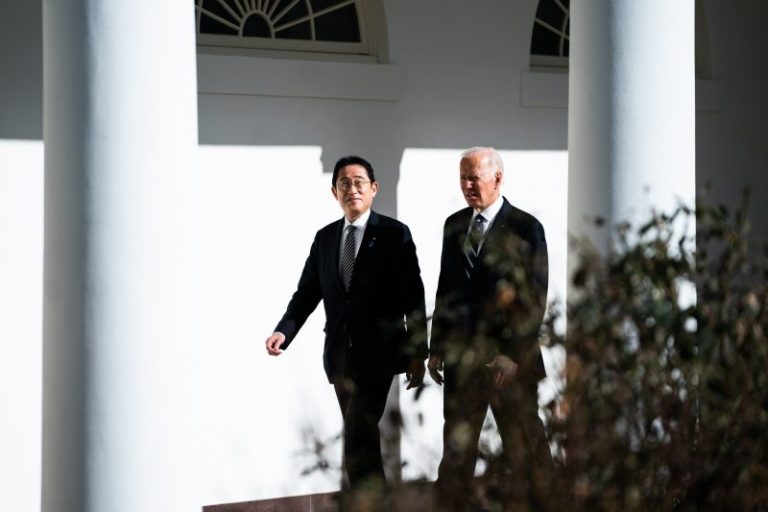President Biden offered a strong show of support for Japan on Friday during a visit by Prime Minister Fumio Kishida, reiterating the “unwavering commitment of the United States to the defense of Japan” as the two leaders announced measures to deepen a strategic alliance to deter China.
Kishida’s first visit to Washington since becoming prime minister just over a year ago comes as he faces domestic troubles at home, with his poll approval ratings often below 40 percent. Biden’s full-throated support of the U.S.-Japan alliance, and his praise for Japan’s ambitious plans to dramatically boost its defense spending, helped boost the prime minister’s global profile.
“I don’t think there’s ever been a time when we were closer,” Biden said of the two nations ahead of a bilateral meeting with Kishida on Friday. “To be crystal clear, the United States is fully, thoroughly, completely committed to the alliance.”
For Biden, the visit was a chance for the president to showcase his statesmanlike abilities amid his own political troubles after classified documents were discovered at his Washington, D.C., think tank and his private residence in Wilmington. Those discoveries prompted Attorney General Merrick Garland to appoint a special counsel on Thursday.
The two leaders affirmed their partnership at a time when both countries are seeking to counter China, Russia and North Korea. Japan, which occupies the presidency of the Group of Seven industrial democracies this year, has taken significant steps to hold Moscow accountable for its invasion of Ukraine, becoming the first country in Asia to join Western democracies in sanctioning Moscow.
“Our security Alliance has never been stronger,” a joint statement between the United States and Japan said. “Together, we have aligned our collective force posture and deterrence capabilities to meet new and emerging threats.”
The statement also said the two countries reaffirmed their economic relationship as well, including a focus on building resiliency in supply chains.
The president’s embrace of Kishida followed three days of meetings between senior Biden administration officials and their Japanese counterparts, and after Japan signaled in December a momentous shift from being a pacifist nation after its loss in World War II to expanding its defense budget and collaborating more closely with the U.S. military.
Japan’s expansion includes plans to adopt long-range missiles that can be used in “counterstrike” missions and building its defense budget to be the third-largest in the world, spending at 2 percent of its gross domestic product. In announcing the changes, Kishida said that Japan is at a “turning point” in its national security policy.
As part of this week’s visit in Washington, U.S. and Japanese officials on Wednesday announced that the U.S. Marine Corps would reconstitute an artillery unit now based on the Japanese island of Okinawa, the 12th Marine Regiment, to become the 12th Marine Littoral Regiment, a more lethal force that can move quietly through the region with anti-ship missiles, advanced radar and other weapons that could be key in any conflict with China.
Defense Secretary Lloyd Austin, visiting Thursday with Japanese Defense Minister Yasukazu Hamada at the Pentagon, characterized the move as a “historic decision” to station “versatile, mobile, and resilient capabilities” in the region.
“In the face of our shared security challenges, these actions will bolster deterrence and allow us to defend Japan more effectively,” Austin said.
Japanese Foreign Minister Yoshimasa Hayashi, appearing Wednesday alongside his American counterparts at the State Department, said the American and Japanese positions are now “perfectly aligned.” In similar fashion to U.S. officials, the foreign minister raised concerns about China’s efforts to upend long-standing international norms, Russia’s attacks on civilian infrastructure in Ukraine, and North Korea’s testing of ballistic missiles.
Austin said Wednesday that he seriously doubts China has imminent plans to launch an invasion on Taiwan, but that U.S. officials had observed Beijing carrying out a series of provocative behaviors.
The reconstituting of the Marine Corps regiment on Okinawa will bring “tremendous capability” to the U.S.-Japan alliance, Austin said, including an anti-ship capability that he called “very, very important.” The unit is expected to spend time on smaller islands southwest of Okinawa, about 100 miles from Taiwan, and would collaborate with other U.S. forces and Japanese troops in the event of conflict.
The United States and Japan also signed two new agreements at the Pentagon this week that will allow the two countries to collaborate more closely on advanced technology like hypersonic weapons and autonomous systems, U.S. defense officials said.

